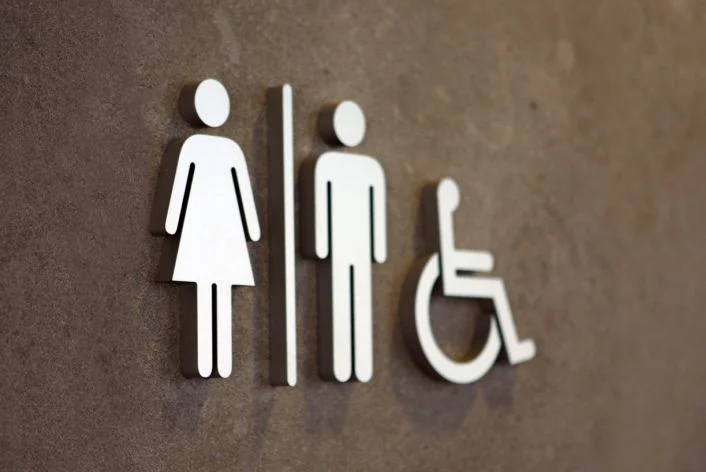DENBIGHSHIRE Council’s cabinet has voted in favour of closing public toilets in St Asaph, Rhuddlan and Dyserth.
During a meeting at the council’s Ruthin County Hall HQ on Tuesday, the chamber heard how a review of public toilets found there was “no identifiable need” for the facilities.
However, there was huge public opposition to the plans, with more than 1,400 residents contacting the council as part of a public consultation last year.
During the meeting, Cllr Peter Scott said: “St Asaph, the city in Denbighshire with no toilets, not a good look.
“You can visit St Asaph, but you can’t go to the toilet.
“The cost of keeping the toilets open is a drop in the ocean really against the goodwill the council will lose.”
He added: “The things (criticisms) I’ve been listening to on the street – ‘a disgrace, essential, elderly, health and safety, unacceptable, baby-changing facilities, people with disabilities’.”
Rhuddlan councillor Anne Davies also slammed the proposals, saying: “It is a huge disappointment to see the recommendations in front of us today to close Rhuddlan’s public toilets.
“I’m not sure how you identified the need because I believe there is a need in Rhuddlan for these toilets.
“If you talk to the residents, if you know the residents as well as I do, particularly those with health needs, we do need them.
“Rhuddlan has a wealth of historic value, and this attracts lots of visitors, and then they support the businesses.
“We have in Denbighshire the highest percentage of old people in Rhuddlan. Surely that should be considered.”
Cllr Martyn Hogg even suggested he would rather see council tax increased than lose the facilities.
Cllr Hogg also said the assessment of toilets and their usage had discriminated against rural areas in terms of the way numbers using facilities had been calculated, as populations were more spread out.
He then said the review didn’t consider the needs of workers, such as postmen and women and utility workers, who were out and about, adding he’d caught binmen “having a wee in the bush next to my house”.
“This is a county-wide need. Wherever there is a public space, there is a need, and perhaps the way we should be dealing with it is to make sure it is considered in the council tax, and if the cost goes up, we should be reflecting that in a council tax increase,” he said.
“I have a real problem with it. I don’t think it is right the way we are assessing this need with a cut off. There is always a need.
“The need is there, and if you listen to the public and you listen to the councillors, they are all screaming that we want to protect this service.”
Cllr Huw Hilditch-Roberts added: “You need to think. All we’ve heard is that this is not a statutory service today.
“But we have a public duty to look at solutions for this rather than closures, and I think it is a bit like the bins.
“Public toilets affect everyone from cradle to grave because whether you are a young child potty training or an elderly (person) who has issues, there is a need for the people of Denbighshire as well as the people who visit.”
Council officer Paul Jackson said the issue was due to council finances.
“You are absolutely right. It is not comfortable for me to be sitting here, recommending to cabinet that we close some of these facilities down,” he said.
“It kind of cuts (goes) against my personal wishes or wants, but the reality of it is what we can afford and what we’ve got the budget for.
“Again, and I stress this, it is non-statutory services, the public conveniences, so I do appreciate the impact could potentially be felt greatest by those people with the greatest need, so ageing people, people with disabilities and the like.
“That is why we are trying to explore other options as outlined in the strategy.”
As part of the strategy, the council plans to upgrade toilets at Rhyl, Prestatyn, Denbigh, Ruthin, Llangollen and Corwen, where “cashless payment” systems will be used to charge customers for “a mobile cleaning team”.
In setting the 2024/25 budget, a review of public conveniences was included as a ‘Major Savings Proposal’ with £200,000 removed from the public toilets’ budget, reducing the budget to £70,000.
But Denbighshire Council now faces a potential £279,000 funding gap after a bid for Welsh Government funds was rejected to pay for the six upgrades, and councillors were told Lottery funds will now be targeted.
Another potential funding stream was town and community councils, but officers admitted they had been met with “radio silence” after repeated approaches for funding.
The cabinet member in charge of toilets, Cllr Barry Mellor, even said he was “thrown out” of Rhyl Town Council after he spoke about toilets and appealed for funds.
Cllr Mellor said he “realised the importance of public toilets” and claimed he had worked with officers to “keep toilets open where there is a clear need for them”.
But other councillors said using the toilet was a “human right”.
Cllr Emrys Wynne was concerned that upgraded cashless toilets could cause problems for people who only carried cash.
But corporate director Tony Ward told Cllr Wynne that cashless toilets allowed investment without increased staff numbers.
Other councillors criticised a community toilet scheme included in the strategy, offering businesses £500 a year to provide facilities to the public, which worked out at just over £1.30 per day.
Officers said they could look at the amount being increased.
The cabinet voted in favour of the strategy, which included both the three public toilet closures and the six upgrades.

















